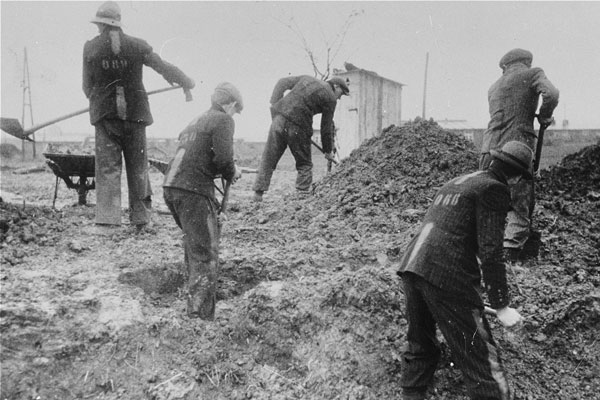
Polish forced laborers at a rail station in Germany, circa 1943–45. US Holocaust Memorial Museum, courtesy of Archiwum Dokumentacji Mechanicznej
What are the repercussions of removing, denying, or reducing citizenship rights? In 1933, Nazi Germany started using forced labor to separate those it wished to exclude from its proclaimed “national community.” During this same period, the United States also required labor from groups it saw as racial or national “enemies” or “outsiders”:
- Japanese incarcerees who labored while being denied their rights as citizens,
- Mexican farm laborers who were invited to work and then denied the rights and protections they were promised, and
- Chinese pioneers who built the Pacific Northwest railroads and worked in mining, only to be excluded from larger society.
Join us for a panel discussion exploring the intersections and divergences between these unique circumstances.
Speakers
Dr. Wolf Gruner, Shapell-Guerin Chair in Jewish Studies and Professor of History, University of Southern California, Los Angeles, California; Founding Director, USC Dornsife Center for Advanced Genocide Research; Member, United States Holocaust Memorial Museum Academic Committee
Dr. Rebecca Scofield, Associate Professor of American History and Chair of the Department of History, University of Idaho, Moscow, Idaho
Moderator
Dr. Kristin Haltinner, Associate Professor of Sociology, University of Idaho, Moscow, Idaho
Registration is required to receive the link to watch.
For more information, contact Kierra Crago-Schneider at kcrago-schneider@ushmm.org.
The mission of the Jack, Joseph and Morton Mandel Center, part of the United States Holocaust Memorial Museum, is to ensure the long-term growth and vitality of Holocaust Studies. To do that, it is essential to provide opportunities for new generations of scholars. The vitality and the integrity of Holocaust Studies require openness, independence, and free inquiry, so that new ideas are generated and tested through peer review and public debate. The opinions of scholars expressed before, during, or after their activities with the Mandel Center do not represent and are not endorsed by the Mandel Center or the Museum.
